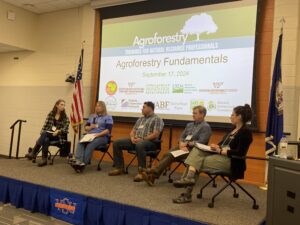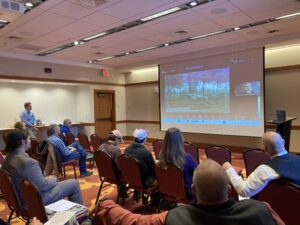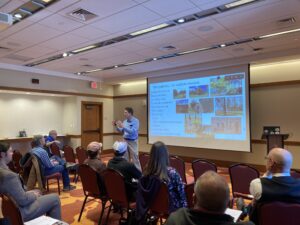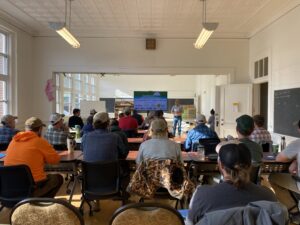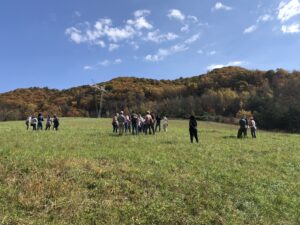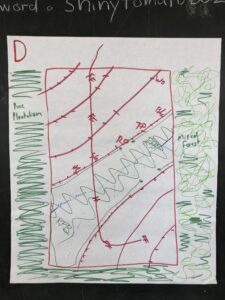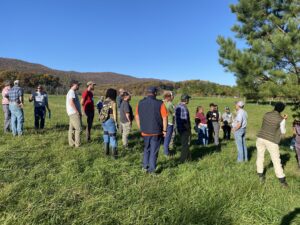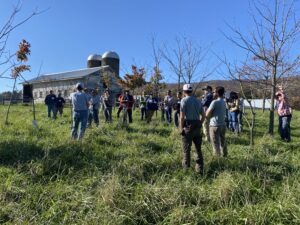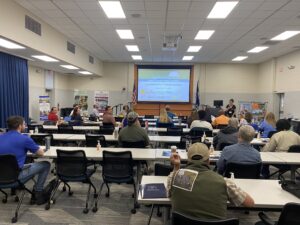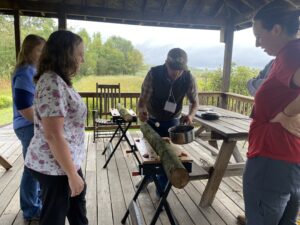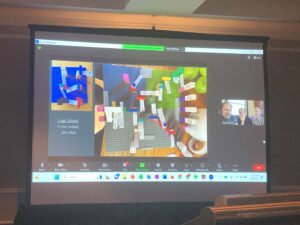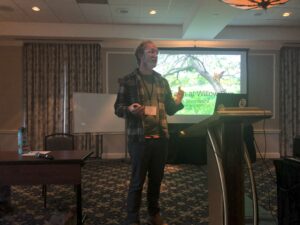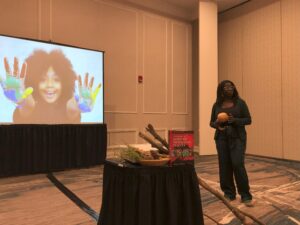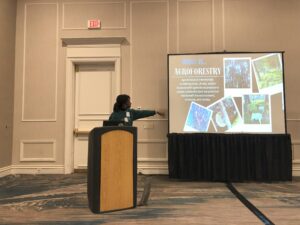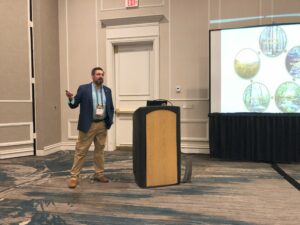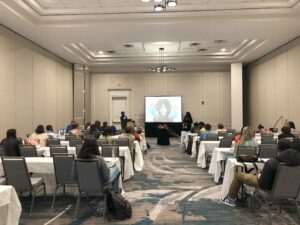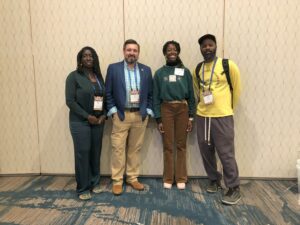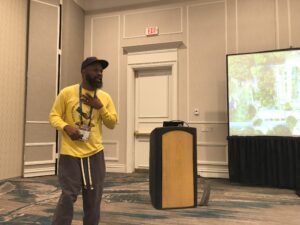Final report for SPDP23-020
Project Information
Agroforestry, an intentional, integrated agriculture + forest management approach, is of increasing interest among Virginia farmers given its ability to improve ecosystem function, support crop and livestock production systems and diversify farm income. Agroforestry systems spatially and strategically integrate trees into agro-ecosystems and non-timber crops into forest ecosystems and can play a role in helping farmers and landowners address the many urgent and complex economic, environmental, and social issues that challenge farm sustainability, profitability, and resilience. Virginia has been at the forefront of agroforestry innovation in research, demonstrations, and training through the years, and from this several Agricultural Educators/Professionals (AgEdPros) have emerged as leaders who provide support to farmers and landowners. However, many aspiring and practicing agroforesters express difficulty accessing support because much of the available agroforestry educational and technical assistance is dispersed. This budding community needs support through coordinated training and network development. This proposal represents a collaboration between Virginia Tech’s Center for Food Systems and Community Transformation (VT-CSFST) and Catawba Sustainability Center (VT-CSC), Virginia State University (VSU), Virginia Cooperative Extension (VCE), Appalachian Sustainable Development (ASD), the Virginia Association for Biological Farming (VABF), and farmers to address this agroforestry-related educational and technical assistance need. Our team will expand Virginia’s Agroforestry Regional Knowledge (ARK) Exchange Network, enhance Train the Trainer (TtT) programming, and amplify awareness and coordination of existing and emerging on-farm research and demonstrations using a collective impact approach to grow agroforestry systems and a coordinated educational technical assistance network in Virginia.
The overall project goal is to expand the Agroforestry Regional Knowledge (ARK) Exchange Network in Virginia using a collective impact approach to strengthen, solidify, and anchor an informal network of farmers, nonprofit organizations, academic institutions, governmental agency, and non-governmental partners across the state through enhanced TtT programming and coordination of existing and emerging on-farm agroforestry systems demonstrations. The project builds on the foundation of earlier agroforestry and silvopasture systems research and demonstrations (e.g., VT-CSC, VT’s Kentland Farm, Shenandoah Valley AREC, Clermont Farm, Southern Piedmont AREC, Jubilee Climate Farm) to better connect the constellation of regional agroforestry educational and technical assistance support that has emerged and gained traction across Virginia the last decade. To this end, we will leverage and build upon the Edwards Mother Earth Foundation (EMEF) Catalyzing the Next Phase of Appalachian Agroforestry (CNPAA) and the Climate Smart Agroforestry: Multi-Regional Training for Technical Service Providers (CSA), led by VT and ASD, respectively, that were initiated early 2022 to: 1) develop and formalize an ARK Exchange Network across the Appalachian region, 2) provide agroforestry TtT programming, and 3) distribute grants to producers to establish agroforestry demonstrations. Presently, 19 of these agroforestry grants have been awarded to producers in Virginia, with at least 50% of the grants awarded to historically underserved audiences. They are also in the process of developing extensive online and in person agroforestry TtT curriculum for silvopasture, alley cropping, and forest farming practices. Additionally, we will expand upon the agroforestry technical assistance and educational programming efforts of other project collaborators including the VT-CSC, VSU’s Small Farm Outreach Program (SFOP), and the two-day Land Planning for Agroforestry workshop recently supported by Virginia SARE as a professional development opportunity.
This two-year SARE professional development programming and peer-to-peer mentoring proposal will specifically engage the following educational and technical assistance provider audiences: VSU Small Farm Outreach Program assistants, Virginia Cooperative Extension agents, NRCS field conservationists and technicians, SWCD district staff, NGO field personnel, farmer mentor-leaders, and other agricultural educational professionals.
Objective 1: Foster communication, coordination, and peer-to-peer learning between educational and technical assistance partners as the ARK Exchange Network to enhance collaboration, permanence, and lasting impact of agroforestry TtT professional development programming in Virginia.
- The ARK Exchange Network will increase the collective impact of project collaborators to develop, share, educate, and disseminate agroforestry research and demonstration-based knowledge in their professional development programming to affect the adoption, implementation, and durability of agroforestry systems by farmers in Virginia.
- The project will strengthen the relationship between Virginia Tech and Virginia State University to increase agroforestry knowledge exchange between the institutions as well as their capacity to collaborate on agroforestry programming, research, and demonstrations.
- Project collaborators will increase their individual organization’s capacity to support farmers' needs for educational and technical assistance.
Objective 2: Provide coordinated agroforestry TtT professional development programming to foster peer-to-peer learning, information sharing, and network building among agricultural educational professionals and farmer mentor-leaders.
- 90% of participants increase their knowledge, skills, and aptitude in agroforestry system design, establishment and maintenance such as knowledge of tree species suited for regions and sites, planting/establishment techniques, protection methods/systems, spatial arrangement, and more
- 90% of participants are equipped with educational knowledge, technical training skills, and cultural community-based competencies to support farmers, especially historically underserved producers, with agroforestry systems adoption, implementation, and maintenance
- 80% of participants increase their awareness of educational resources, specialist support, and existing and emerging on-farm research and demonstration sites within their region and statewide as part of the ARK Exchange Network
- 30% of farmer mentor-leaders and AgEdPro participants have or plan to initiate or enhance existing projects that can serve as demonstration case studies
- 30% of AgEdPros and farmer mentor-leaders participants have offered or plan to offer agroforestry training programs for farmers in their region
- 30% of AgEdPros and farmer mentor-leaders participants have offered or plan to offer 1:1 support to aspiring or established agroforesters
- At least 13 VSU-SFOP Assistants, and 5 mentor farmers they work with, will increase their knowledge of agroforestry
- Over 100 AgEdPros and mentor farmers will participate in project programs
- Over 100 AgEdPros and mentor farmers join the ARK Exchange Network
Long-term changes/impacts, beyond the project may include:
- Greater adoption, implementation, and longevity of agroforestry systems
- Formalized and expanded ARK Exchange Network that is adaptive and responsive to culture, context, and change
- Improved ecological function and health
- Integrated multi-faceted stacked agricultural, livestock, and value-adding enterprises
- Increased climate resilience on farms
- Greater quality of life for producers, communities, and consumers including improved economic well-being of farmers
Cooperators
- - Producer
- (Educator)
- (Researcher)
- - Technical Advisor (Researcher)
- - Producer (Educator)
- - Producer (Educator)
Education
Project collaborators have a long track record of collaboration and providing TtT to AgEdPros and farmers through their organizations, including: VCE, VSU-SFOP, VT-CFSCT, VT-CSC, VBFRC and ASD. They will leverage their networks to reach the targeted professional development programming audience, with direct focus on enhancing educational and technical assistance provision to historically underserved farmers.
Their educational approach includes offering programs that:
- Are driven by farmer mentor-leader input
- Focus on peer learning, including encouraging a team approach where AgEdPros and farmer mentor-leaders attend trainings together, and inviting them to share their on-the-ground experience as speakers in programs
- Showcase existing regional agroforestry demonstrations
- Build upon online and in-person curriculum developed through ASD’s CSA Project and previous SARE PDP projects
- Amplify agroforestry within small, underserved, veteran, biological, and beginning farmer communities in Virginia.
Project activities are diverse and multi-pronged including a virtual webinar series, development of a new agroforestry demonstration, full-day and multi-day events, and participation in existing conferences. Project collaborators developed this plan in collaboration, drawing on their diverse and expansive experience moving agroforestry forward in Virginia over the last decade. If COVID-19 restrictions occur, we will adapt programs to be virtual or outdoors.
Winter Agroforestry Webinar Series
An agroforestry webinar series will be held in the winter of 2024 featuring “Agroforestry on the Ground in Virginia.” The series will be co-hosted by project collaborators. Farmer mentor-leaders and AgEdPros with on the ground experience will be invited as speakers to share regional showcase examples across Virginia. They will present why they pursued agroforestry, methods of establishment, and lessons learned through their innovation and teamwork. The webinars will be recorded and archived on the VT-CFSCT’s website.
VSU-SFOP Agroforestry Demonstration
The VSU-SFOP will work with a team of their Program Associate leaders and a selected farmer in the region to develop a new agroforestry demonstration. Practice selection and system design will be developed in collaboration with the farmer and with the support of VT and ASD project collaborators' agroforestry expertise. This demonstration will be established in Y1 of the grant term and will be featured in the 1-day Agroforestry Introduction Workshop at VSU’s Randolph Farm in Y2.
2-Day Agroforestry TtT Field Intensive at the VT-CSC
A 2-day Agroforestry TtT Field Intensive hosted at the VT-CSC will be held in Fall of 2024. This training will showcase the VT-CSC’s diversity of agroforestry demonstrations through in-field learning and will include multimedia presentations from experts and interactive panel discussions with farmer mentor-leaders and AgEdPros about ways to navigate implementation on the ground for this innovative practice. The training will feature a custom curriculum to provide participants with foundational and in-depth knowledge for designing, establishing, and maintaining agroforestry systems. All five common agroforestry practices will be covered, but silvopasture, alley cropping, and forest farming will be featured in more depth due to their applicability to Virginia landscapes and need for more training information. An online pre-training module will be provided to participants to prepare for the in-person training. A curriculum development team will meet regularly to plan the curricular aspects of the event (Warren, Munsell, Trozzo, Taylor). The 2-day event curriculum will build upon curriculum developed through ASD’s CSA Project, currently in development, and will tie in resources from previous SARE PDPs. AgEdPros and farmer mentor-leaders will be encouraged to participate as a team, inviting farmers to bring their AgEdPros, and AgEdPros to bring their farmers. At least 6 and up to 10 VSU-SFOP Assistants will be joining with farmer mentors they work with and we will invite AgEdPros across different institutions and sectors throughout the state to join in similar fashion.
1-Day Agroforestry TtT Introduction Workshop the VSU-SFOP Randolph Farm
A 1-day Agroforestry TtT Introduction Workshop will be hosted at the VSU-SFOP’s Randolph Farm in the Fall of 2024. The event will provide introductory information to all of VSU-SFOP’s Program Assistants and will be promoted broadly within Virginia AgEdPro networks. This 1-day TtT program will offer a learning opportunity for AgEdPros looking for a shorter format entry point into agroforestry and for those who are situated across the state. The program will include condensed curriculum presentations covering the basics of agroforestry, presentations on the agroforestry work going on at the VT-CSC, and an overview of VSU’s new agroforestry demonstration from the farmer mentor-leader and AgEdPros involved in establishment (in the field if time and location allow). A 1-day event planning team will meet regularly to plan the details and logistics of the event (Trozzo, Brown).
Conference Tracks and Panels
This project will also provide TtT learning opportunities at existing annual Virginia-based conferences that serve AgEdPros and farmer mentor-leaders, including:
- An Agroforestry Panel Discussion at VSU’s Small Farms Conference
- An Agroforestry Track at the Annual VABF Conference
- An Agroforestry Professional Development Session at the VCE Winter Conference
Beyond providing TtT programming to AgEdPros and farmer mentor-leaders across the Commonwealth, project activities are designed to help project collaborators develop capacity to continue agroforestry TtT programming, multiply their outputs and sustain outcomes in the future. Building off previous work, this project will solidify project collaborators’ collective work under the banner of the ARK Exchange Network providing a framework to continue supporting agroforestry adoption in Virginia. If funded, this SARE PDP project would provide much needed support to strengthen opportunities for project partners to continue to collaborate on TtT programming for greater reach and impacts with a diversity of farmers.
Our trainings contribute to sustainable agriculture in the Southern SARE Region by way of expanding agroforestry across the landscape through increased capacity for AgEdPros and farmer mentor-leaders to serve farmers and landowners interested in establishing agroforestry systems. With our focus on improving support to historically underserved populations, this project will help increase equity in the region. Agroforestry in practice not only impacts farm viability, but provides ecological and social impacts that span beyond the farm and across the larger food system.
Education & Outreach Initiatives
This activity addresses these two objectives:
Objective 1: Foster communication, coordination, and peer-to-peer learning between educational and technical assistance partners as the ARK Exchange Network to enhance collaboration, permanence, and lasting impact of agroforestry TtT professional development programming in Virginia.
Objective 2: Provide coordinated agroforestry TtT professional development programming to foster peer-to-peer learning, information sharing, and network building among agricultural educational professionals and farmer mentor-leaders.
The Virginia Tech Center for Food Systems and Community Transformation partnered with Appalachian Sustainable Development to host this winter webinar series as part of their Ask an Agroforester online webinar program. We created an advisory group of farmer mentor leaders as part of the project and collected topics of interest for the webinar series. The webinars featured AgEdPros and farmer mentor-leaders in Virginia showcasing regional examples and topics of interest. The series was hosted January to May 2023, held monthly in the evenings from 6:30-8:00 pm. Topics and descriptions include:
- January 25: Ask an Agroforester “Funding Edition” with Ian Nichols, Audrey Epp Schmidtt, and Leif Gonzales-Kramer (61 participants; Recording has 237 views) Description: Are you interested in silvopasture and other agroforestry funding opportunities but don’t know where to start? Join us for a presentation and discussion of three large grant programs now active in the Southeast. Representatives from each grant will give short presentations and will field questions about funding eligibility, processes, and requirements. We will talk about the similarities and differences between these programs and share how some of them can (or in some cases, explicitly cannot!) stack together with other funding programs to help individuals cover additional costs.
- February 28: Ask an Agroforester “Agroforestry in the Urban Context” with Duron Chavis (44 participants; Recording has 133 views)
Description: Are you interested in exploring agroforestry in the urban context? Join us to hear from Duron Chavis, founder of Happily Natural Day. He will share about edible food forests in the City of Richmond, opportunities and challenges of agroforestry in urban areas, and why this work is important for urban communities.
- March 27: Ask an Agroforester “Silvopasture and Alley Cropping Management” with Adam Taylor (27 participants; Recording has 106 views)
Description: Are you wondering how to manage complex Agroforestry systems like Silvopasture and Alley Cropping? Join us and learn from a pro! Adam Taylor manages Virginia Tech’s Catawba Sustainability Center farm, which implements all kinds of Agroforestry projects and practices. If you’re a farmer or land manager – this one’s for you!
- April 25: Ask an Agroforester “Youth Engagement and Education in Agroforestry” with Adam Taylor (10 participants, Recording has 52 views)
Description: Join us to explore youth education approaches for teaching agroforestry as well as projects for youth engagement in the practice. - May 29: Ask an Agroforester “Land Access and Agroforestry” with Ebonie Alexander and Ryan Huish (47 participants; Recording has 144 views)
Description: Join us for a live panel with Ebonie Alexander of the Black Family Land Trust, and Zev Friedman of Cooperate WNC. We’ll be discussing land access, historic precedent, equitable models, mutual aid and more!
- 5 webinars were completed, engaging 189 live attendees (mixture of AgEdPros and Farmer Mentor Leaders) and gaining 672 views across the archived series.
- 100% of respondents from the post-webinar surveys (n=26) indicated they found the content interesting and relevant and gained a better understanding of the webinar topic area.
- Increased collaborative capacity between the Virginia Tech Center for Food Systems and Community Transformation and Appalachian Sustainable Development through collaborative hosting of the series.
- AgEdPros and Farmer Mentors were able to access information of relevance to agroforestry in the Virginia context.
- 1 googlesheet resource table was created sharing funding options that support agroforestry. Appalachian Sustainable Development then made a flyer with the information.
This activity addresses these two objectives:
Objective 1: Foster communication, coordination, and peer-to-peer learning between educational and technical assistance partners as the ARK Exchange Network to enhance collaboration, permanence, and lasting impact of agroforestry TtT professional development programming in Virginia.
Objective 2: Provide coordinated agroforestry TtT professional development programming to foster peer-to-peer learning, information sharing, and network building among agricultural educational professionals and farmer mentor-leaders.
VSU Small Farm Outreach Program (VSU-SFOP) installed two demonstration plantings (more details listed in the case summaries). One is a multi-functional riparian demonstration at VSU’s Randolph Farm in Petersburg, Virginia, established in the Fall of 2024 and Spring of 2025 in collaboration with Dr. Trakela-Wright Hicks, an Urban Forestry Specialist in VSU’s College of Agriculture and Life Sciences. The other is an urban alley cropping and forest farming demonstration installed at the Sankofa Community Orchard in Richmond, Virginia in the spring of 2025 in collaboration with Duron Chavis of Happily Natural Day. Volunteers helped establish the demonstrations and multiple workshops were conducted featuring the demonstrations. Over 5 workshops, serving over 100 Mentor Farmers and AgEdPros as well as youth, were conducted featuring the demonstrations (1 workshop for Sankofa with 20 attendees; 4 workshops for Randolph Farm with 80 attendees).
- Over 80 Mentor Farmers and AgEdPros as well as youth were involved in establishing the demonstrations (20 volunteers with Sankofa demonstration and 60 volunteers for the Randolph Farm Demonstration).
- Over 80 Mentor Farmers and AgEdPros as well as youth were trained about multi-functional riparian buffers.
- Over 20 Mentor Farmers were taught about forest farming and alley cropping in urban settings.
- VSU SFOP increased their capacity to provide educational support to farmers in their region interested in agroforestry through established demonstrations that can serve as learning sites.
- VSU SFOP created collaborative partnerships with new faculty members on campus.
- VSU SFOP strengthened collaborative capacity with a local agroforestry nonprofit in serving the region through an established demonstrations that can serve as learning sites.
- VSU SFOP and Virginia Tech developed collaboration capacity between the institutions in planning the demonstrations and cross institutional knowledge was exchanged for the design of the multi-functional riparian buffer demonstration.
This activity addresses these two objectives:
Objective 1: Foster communication, coordination, and peer-to-peer learning between educational and technical assistance partners as the ARK Exchange Network to enhance collaboration, permanence, and lasting impact of agroforestry TtT professional development programming in Virginia.
Objective 2: Provide coordinated agroforestry TtT professional development programming to foster peer-to-peer learning, information sharing, and network building among agricultural educational professionals and farmer mentor-leaders.
A 1-day Agroforestry Training for Natural Resource Professionals “Agroforestry Fundamentals” Workshop was hosted at the VSU-SFOP’s Randolph Farm on September 17, 2024. The event provided introductory information to Virginia AgEdPros and Farmer Mentors as an entry point into agroforestry. The program included presentations covering the basics of agroforestry, a producer panel, a presentation on agroforestry at the VT CSC, and hands-on field sessions. We were able to feature speakers from VSU, Virginia Tech, ASD and forest farmers.
- 37 AgEdPros and Farmer Mentors were trained in the fundamentals of agroforestry (4 were VSU SFOP Program Assistants)
- 9 participants attained 4 NRCS contact hours
- 100% of respondents of the survey (n=15) indicated they agreed or strongly agreed their knowledge of agroforestry increased.
- 90% of respondents of the survey (n=15) indicated they agreed or strongly agreed they felt more capable of providing agroforestry support to producers after completing the program.
- 100% of respondents of the survey (n=15) indicated they agreed or strongly agreed they had greater awareness of educational resources, support, and demonstration sites.
- 90% of respondents of the survey (n=15) indicated they agreed or strongly agreed they plan to use knowledge learned through this program in my educational activities and/or services for producers.
- 30% of respondents of the survey (n=13) indicated they agreed or strongly agreed they have offered or plan to offer agroforestry trainings for producers in their region.
- 28% of respondents of the survey (n=13) indicated they agreed or strongly agreed they plan to start a project or build upon an existing one that can serve as a demonstration site.
- 60% of respondents of the survey (n=13) indicated they agreed or strongly agreed they have offered or plan to offer 1:1 assistance to producers interested in agroforestry
- 11 speakers were engaged in the program spanning 5 organizations/institutions and including representation from 3 forest farmers.
- Virginia Tech Center for Food Systems and Community Transformation, VSU-Small Farm Outreach Program, the Virginia Tech Catawba Sustainability Center, and Appalachian Sustainable Development built collaborative capacity in planning this 1-day event.
- VSU SFOP was able to connect agroforestry two speakers on VSU campus they had not engaged with before.
- Partnership was further formalized with NRCS by reserving 15 spaces for their staff and scheduling the event on a date that works with their calendar.
- Partnership with Virginia Cooperative Cooperative Extension was deepened through their fiscal support of 7 VCE agents/specialists attending the event.
- The Virginia Tech Catawba Sustainability Center Farm Manager and the Appalachian Sustainable Development Agroforester attended this workshop to cross exchange knowledge between institutions/organizations.
This activity addresses these two objectives:
Objective 1: Foster communication, coordination, and peer-to-peer learning between educational and technical assistance partners as the ARK Exchange Network to enhance collaboration, permanence, and lasting impact of agroforestry TtT professional development programming in Virginia.
Objective 2: Provide coordinated agroforestry TtT professional development programming to foster peer-to-peer learning, information sharing, and network building among agricultural educational professionals and farmer mentor-leaders.
A 2-day Agroforestry Training for Natural Resource Professionals “Silvopasture 201” was held at the VT-CSC on October 24-25, 2024. The training focused on Silvopsature and went into depth, providing more of a 201 deep dive. This was decided by the curriculum development team based on the need for in-depth training to be able to train AgEdPros and farmer mentors in supporting the groundswell of interest in silvopasture in Virginia. The training showcased the VT-CSC’s diversity of agroforestry demonstrations through in-field learning and along with multimedia presentations from experts and interactive panel discussions with farmer mentor-leaders and AgEdPros about ways to navigate implementation on the ground for this innovative practice. The program culminated with a hands-on design activity.
- 37 AgEdPros and Farmer Mentors were trained in the fundamentals of agroforestry (4 were VSU SFOP Program Assistants)
- 28 participants attained continuing education credits (10 received 10 SAF Continuing Education Credits, 8 participants attained 10 DCR Credits, 10 participants attained 10 NRCS contact hours)
- 100% of respondents of the survey (n=23) indicated they agreed or strongly agreed their knowledge of silvopasture increased.
- 100% of respondents of the survey (n=23) indicated they agreed or strongly agreed they felt more capable of providing silvopasture support to producers after completing the program.
- 100% of respondents of the survey (n=23) indicated they agreed or strongly agreed they had greater awareness of educational resources, support, and demonstration sites.
- 96% of respondents of the survey (n=23) indicated they agreed or strongly agreed they plan to use knowledge learned through this program in my educational activities and/or services for producers.
- 57% of respondents of the survey (n=23) indicated they agreed or strongly agreed they have offered or plan to offer agroforestry trainings for producers in my region
- 35% of respondents of the survey (n=23) indicated they agreed or strongly agreed they plan to start a project or build upon an existing one that can serve as a demonstration site.
- 26% of respondents of the survey (n=23) indicated they agreed or strongly agreed they have offered or plan to offer 1:1 assistance to producers interested in agroforestry
- 7 speakers were engaged in the program spanning 6 organizations/institutions and including representation from 3 forest farmers.
- Virginia Tech Center for Food Systems and Community Transformation, the Virginia Tech Catawba Sustainability Center, and Appalachian Sustainable Development built collaborative capacity in planning this training.
- Partnership was further formalized with NRCS by reserving 15 spaces for their staff and scheduling the event on a date that works with their calendar.
- Partnership with Virginia Cooperative Cooperative Extension was deepened through their fiscal support of 1 VCE agents/specialists attending the event.
This activity addresses these two objectives:
Objective 1: Foster communication, coordination, and peer-to-peer learning between educational and technical assistance partners as the ARK Exchange Network to enhance collaboration, permanence, and lasting impact of agroforestry TtT professional development programming in Virginia.
Objective 2: Provide coordinated agroforestry TtT professional development programming to foster peer-to-peer learning, information sharing, and network building among agricultural educational professionals and farmer mentor-leaders.
This project will also provide TtT learning opportunities at existing annual Virginia-based conferences that serve AgEdPros and farmer mentor-leaders, including: 1) An Agroforestry Track at the Annual VABF/VSU-SFOP 2024 Summit, 2) An Agroforestry Panel Discussion at VSU’s Small Farms Conference, and 3) An Agroforestry Professional Development Session at the VCE Winter Conference
- The Agroforestry Track at the Virginia Association for Biological Farming and VSU Small Farm Outreach Program Summit 2024 was completed. The two organizations partnered this year, combining their individual annual conferences into a joint summit with 604 attendees. Sessions featured 14 speakers and included:
- "Pawpaws to the People: Preservation and Development of North America's Largest Superfruit” with Ben Casteel [35 attendees]
- "Community of Practice: Multi-strata Agroforestry” with Steven Wilder [42 attendees]
- "Agroforestry Integration for the Small Farm” with Stesha Warren [53 attendees]
- "Agroforestry Regional Knowledge (ARK) Exchange Network - Agroforestry Panel Discussion” with Katie Trozzo, Ian Nichols, Cornelius Deppe, Ryan Huish, Dana Lydon [26 attendees]
- "Alley Cropping: Design, Implementation, and Production at Virginia Tech's Catawba Sustainability Center” with Adam Taylor, Stesha Warren [24 attendees]
- "Integrating Nitrogen Fixers in Diverse Settings” with Dani Baker [50 attendees]
- "Native Perennial Food Plants for your Edible Landscape” with Dani Baker [52 attendees]
- "Silvopasture: Thinking Through the Design Process” with Emilie Tweardy [20 attendees]
- The Agroforestry Panel at the VSU Small Farms Conference was held in October of 2024 and featured 4 speakers on the following topics:
- Duron Chavis of Happily Natural Day on “Urban Food Forests”
- Tabitha and Nasya Bugg from Truth Village Farms on “Ethnobotanical Products and Goat Silvopasture”
- Justin Barnes of the VA Dept of Forestry on “Silvopasture and Forest Management”
- A workshop was held at the VCE Winter Conference in February of 2025 on “Agroforestry 101” featuring three VCE Specialist speakers (John Munsell, John Fike, and Adam Downing)
- 389 total Farmer mentors and AgEdPros were engaged in agroforestry content at existing agricultural conferences in Virginia
- 302 Farmer mentors and AgEdPros were engaged across a track of 8 Agroforestry Sessions at the VABF/VSU-SFOP Summit in 2024.
- 73 Farmer mentors and AgEdPros increased their knowledge of agroforestry at the VSU Small Farms Conference
- 14 AgEdPros increased their knowledge of agroforestry at the VCE Winter Conference
- Increased collaborative capacity between VT, VSU-SFOP, Appalachian Sustainable Development and the Virginia Association for Biological Farming to offer coordinated agroforestry training to farmer mentors and AgEdPros at the 2024 Summit.
- Deepened partnership and collaborative capacity with VCE through the workshop at the VCE Winter Conference.
- Increased collaborative capacity between VT and VSU-SFOP in hosting the agroforestry panel at the Small Farms Conference.
This activity addresses these two objectives:
Objective 1: Foster communication, coordination, and peer-to-peer learning between educational and technical assistance partners as the ARK Exchange Network to enhance collaboration, permanence, and lasting impact of agroforestry TtT professional development programming in Virginia.
Objective 2: Provide coordinated agroforestry TtT professional development programming to foster peer-to-peer learning, information sharing, and network building among agricultural educational professionals and farmer mentor-leaders.
We held quarterly meetings with all project partners and recruited an advisory group of agroforesters that met quarterly and provided input on project activities. Our advisory group included 5 mentor farmer members representing different practices and regions in the state.
- Corneleus Deppe of Silver Run Forest Farm
- Ryan Huish of Appalachian Cove Forest Farm and Homestead
- Dana Beegle of Stone Root Farm
- Duron Chavis of Happily Natural Day
- Ebonie Alexander of Black Family Land Trust
- We held seven quarterly meetings with all partners over the project term.
- We held six quarterly meetings of the advisory group over the project term.
- We were able to develop collaborative capacity among advisory group members and reach new groups of forest managers
- We were able to develop greater collaborative capacity between the 12 partners on the project representing 7 organizations.
Objective 1: Foster communication, coordination, and peer-to-peer learning between educational and technical assistance partners as the ARK Exchange Network to enhance collaboration, permanence, and lasting impact of agroforestry TtT professional development programming in Virginia.
The Agroforestry Regional Knowledge Exchange Network (ARKx) is a peer-to-peer learning network where land managers/farmers, technical service providers, agricultural educators, business owners, non-governmental organizations and universities can generate and share knowledge with one another to help promote agroforestry throughout the United States. Through this project we were able to support the further build out of the network and increase partnerships and participation among Virginia organizations, Farm Mentor Leaders, and AgEdPros.
- The ARKx Network was a formal partner in the educational programming offered during this project
- A formalized website for the ARKx Network was created and refined and includes multiple ways for the agroforestry community to connect including a national map, demonstration listings, and a shared calendar.
- The ARKx network expanded from its original Appalachian regional focus to a national focus due to interest among other regions in networking in this way
- The ARKx newsletter gained 331 sign-ups, 257 of which are from the Southeast/Appalachian region and that this project helped support.
- 5 demonstration sites were listed on the ARKx website for Virginia
Educational & Outreach Activities
Participation summary:
Learning Outcomes
Project Outcomes
Throughout the program we were able to expand the ARKx Network in Virginia through enhanced TtT programming coordination and on-farm agroforestry systems demonstrations.
The short term outcomes of the project include the following:
- 100% of respondents to the post training surveys (n=38) indicated an increase in knowledge, skills, and aptitude in agroforestry system design, establishment, and maintenance.
- “The program increased my knowledge on agroforestry” - follow up survey respondent
- 97% of respondents to the post training surveys (n=38) indicated an increase in their capacity to support farmers, especially historically underserved producers, with agroforestry system adoption, implementation, and maintenance
- “The workshops helped me feel more confident in defining agroforestry and feel prepared to answer questions and provide resources for any clients who may be interested in agroforestry.” - follow up survey respondent
- “I feel capable to install a silvopasture component to the farm I manage.” - follow up survey respondent
- 100% of respondents to the post training surveys (n=38) indicated an increase in awareness of resources, support, and demonstration sites that are part of the ARK Exchange Network
- “The workshop provided contact info should there be a need for more extensive information for producers.” - follow up survey respondent
- Project collaborators indicated an increase in their collective impact to develop, share, educate, and disseminate agroforestry research and demonstration-based knowledge in their professional development programming. An example includes the ARKx website with demonstration listings, key resources, and a shared calendar.
- Individual organizational capacity to support farmers' needs for educational and technical assistance increased. For example, VSUand Sankofa Community Orchard established a new demonstration to support agroforestry education.
- The increased capacity of Virginia Tech and Virginia State University to exchange agroforestry knowledge and collaborate on agroforestry professional development projects was noted by partners as a significant impact of the project.
Initial Action Intermediate Outcomes include the following:
- 331 participants joined Join the ARK Exchange Network, 257 of which were from the Appalachian/Southeastern region
- 3 respondents to a follow up survey indicated they initiated or enhanced existing projects that serve as regional demonstration case studies with 8 total demonstrations they have supported
- 5 respondents of the follow up survey indicated they had offered new or enhanced existing agroforestry farmer education programs in their region as a result of the trainings, reaching 264 land managers through their programming.
- 6 respondents of the follow up survey indicated they have provided 1:1 support to aspiring and established agroforesters since the training, serving 60 total land managers.
- “I have been recommending various agroforestry practices to my clients now that I better understand the technical aspects of them.” - follow up survey respondent
Secondary Action Intermediate Outcomes include the following:
- Greater adoption, implementation, and durability of agroforestry systems is likely given 132 AgEdPros and 460 Farmer Mentors were provided general and deep dive training on agroforestry systems and some of the follow up survey respondents have indicated they are sharing this information in 1:1 and group programming scenarios.
- Over the course of the project, the ARKx became formalized and expanded to a national level scope. Multiple features are available online to help connect the agroforestry community including a shared calendar, national map, and demonstrations.
Meeting Project Objectives
Below we will share the original project objectives and then how we met them.
Objective 1: Foster communication, coordination, and peer-to-peer learning between educational and technical assistance partners as the ARK Exchange Network to enhance collaboration, permanence, and lasting impact of agroforestry TtT professional development programming in Virginia.
- The ARK Exchange Network will increase the collective impact of project collaborators to develop, share, educate, and disseminate agroforestry research and demonstration-based knowledge in their professional development programming to affect the adoption, implementation, and durability of agroforestry systems by farmers in Virginia.
- The ARK Exchange Network has been further articulated as a nation-wide peer to peer network and website has been created as well as a listserv. The development was made possible by a project supported by the Edwards Mother Earth Foundation and led by Dr. John Munsell, a partner on the SARE project. The SARE project allowed additional project partners to help develop the network and provided a statewide grounding to the development of the network. Our Virginia project further built out our statewide agroforestry network and tied it into the larger ARK Exchange Network. One project partner noted how important it is for multiple streams of funding to be leveraged in collaboration to create a greater impact and how significant it is to be creating a national network with strong state-wide support.
- This project supported a diverse web of collaborative projects that strengthened relationships and developed collaboration capacity to work across institutions and organizations. The VABF/SFOP Summit was offered by VT, VSU, and VABF and allowed them to deepen their collaborative capacity and ability to provide agroforestry programming. The Winter Webinar series was offered in collaboration with VT and ASD and deepened their ability to serve the agroforestry community. The 2-day in person training was developed between VT CSC, VT CFSCT, and ASD and is offered opportunities for them to further their collaboration and relationship. The 1-day in person training was developed between VT CFSCT, VSU and ASD, which is connecting ASD and VSU for the first time in collaboration. Both of these trainings also further connected with NRCS and VCE with project partners.
- Project collaborators and advisory group members valued the opportunity to connect and collaborate for collective impact:
- “The opportunities to come together to meet each other and be aware of the projects and find ways of collaborating we didn’t even know…where the overlap is and where we can learn from one another…this was a great part of the project.” - advisory group member
- “Coordination between organizations and institutions has been essential.” - project partner
- “Making connections within the advisory group was really important” - advisory group member
- “There is a greater connectivity within the agroforestry community in Virginia.” - project partner
- Training participants were able to better connect with one another and project partners:
- Training participants enjoyed meeting one another and networking, for instance one noted “they were able to make connections with other agroforestry professionals, which isn't always easy to do in our region.”
- “TSPs from forestry and ag side coming together for the trainings was really great.” - advisory group member
- The project will strengthen the relationship between Virginia Tech and Virginia State University to increase agroforestry knowledge exchange between the institutions as well as their capacity to collaborate on agroforestry programming, research, and demonstrations.
- VT and VSU deepened their partnership regarding agroforestry and exchanged knowledge throughout the project, including through the VABF/VSU Summit Agroforestry panel, the 1-day Randolph Farm workshop, the 2-day CSC workshop, the Small Farm Conference Agroforestry panel, and the demonstration projects.
- “Connection between VSU and VT on agroforestry was great.” - advisory group member
- “The training at VSU’s Randolph Farm, making those connections personally with VSU, that was a great workshop! So many new professional and personal connections were made that day.” -advisory group member
- VT and VSU deepened their partnership regarding agroforestry and exchanged knowledge throughout the project, including through the VABF/VSU Summit Agroforestry panel, the 1-day Randolph Farm workshop, the 2-day CSC workshop, the Small Farm Conference Agroforestry panel, and the demonstration projects.
- Project collaborators will increase their individual organization’s capacity to support farmers' needs for educational and technical assistance.
- VSU will be put on more agroforestry training for AgEdPros than prior to the training. Through this project we were able to create connections with VSU faculty (new and old) focused on agroforestry and uplifted up their expertise at the Small Farm Outreach Program’s agroforestry training. Some of these connections had not been made yet between the farm and campus. VSU SFOP also increased their capacity to provide educational support to farmers in their region interested in agroforestry through established demonstrations that can serve as learning sites. We also had partnership and participation for the in-person trainings from NRCS, VCE, SFOP and through this TtT programming, we anticipate their organizations ability to provide technical assistance increased.
Objective 2: Provide coordinated agroforestry TtT professional development programming to foster peer-to-peer learning, information sharing, and network building among agricultural educational professionals and farmer mentor-leaders.
- 90% of participants increase their knowledge, skills, and aptitude in agroforestry system design, establishment and maintenance such as knowledge of tree species suited for regions and sites, planting/establishment techniques, protection methods/systems, spatial arrangement, and more
- 100% of respondents to the post training surveys (n=38 ) indicated an increase in knowledge, skills, and aptitude in agroforestry system design, establishment, and maintenance.
- 90% of participants are equipped with educational knowledge, technical training skills, and cultural community-based competencies to support farmers, especially historically underserved producers, with agroforestry systems adoption, implementation, and maintenance
- 97% of respondents to the post training surveys (n=38 ) indicated an increase in their capacity to support farmers, especially historically underserved producers, with agroforestry system adoption, implementation, and maintenance.
- 80% of participants increase their awareness of educational resources, specialist support, and existing and emerging on-farm research and demonstration sites within their region and statewide as part of the ARK Exchange Network
- 100% of respondents to the post training surveys (n=38 ) indicated an increase in awareness of resources, support, and demonstration sites that are part of the ARK Exchange Network
- 30% of farmer mentor-leaders and AgEdPro participants have or plan to initiate or enhance existing projects that can serve as demonstration case studies
- 54% of respondents to the post training surveys (n=37) indicated they plan to start a project or build upon an existing one that can serve as a demonstration site.
- 30% of AgEdPros and farmer mentor-leaders participants have offered or plan to offer agroforestry training programs for farmers in their region
- 43% of respondents to the post training surveys (n=35) indicated they plan to start a project or build upon an existing one that can serve as a demonstration site.
- 30% of AgEdPros and farmer mentor-leaders participants have offered or plan to offer 1:1 support to aspiring or established agroforesters
- 75% of respondents to the post training surveys (n=36) indicated they plan to start a project or build upon an existing one that can serve as a demonstration site.
- At least 13 VSU-SFOP Assistants, and 5 mentor farmers they work with, will increase their knowledge of agroforestry
- 8 VSU-SFOP Assistants were trained through this program along with 2 farmer they work with. It was more challenging than realized to coordinate with farmers to attend with their assistants. However, coming out of the project, we are seeing more VSU-SFOP farmers engaged in programs we are hosting in 2025.
- Over 100 AgEdPros and mentor farmers will participate in project programs
- We had over 820 participants in project educational programming
- Over 100 AgEdPros and mentor farmers join the ARK Exchange Network
- 331 participants joined Join the ARK Exchange Network, 257 of which were from the Appalachian/Southeastern region
Unanticipated Outcomes
- Through connections with our advisory group, we had the opportunity to raise the visibility of agroforestry in new networks of land managers such as the urban farming community in Richmond and landowners connected to the Black Family Land Trust
- 5 additional workshops beyond the original project scope were offered, featuring the demonstration plantings and serving over 100 Farmer Mentor Leaders and land managers.
- Project partners received additional funding for professional development programming from Edwards Mother Earth Foundation (EMEF) from 2024-2025, which allowed for ASD to engage more deeply in the SARE programs and allowed us to continue the momentum from the SARE project by providing a follow on Forest Farming 201: Design Intensive two-day program in August of 2025.
- Project partners applied for follow-on funding from EMEF to continue the work into 2026 and 2027 and are waiting for the funding decision.
- Project partners collaborated on creating a google spreadsheet of funding information for agroforestry projects and then ASD used that information to create a funding factsheet.
- The ARKx website continues to be built out with new features coming soon to help further connect members of the network.
Additional Quotes from Training Participants
- Agroforestry Fundamentals, September 17, 2024 Training
- “Fantastic program, could have been a 2 day!”
- “This was an excellent experience.”
- “Greatly enjoyed the field session.”
- Sivlopasture 201: Design Intensive, October 24-25, 2024
- “This program was not only informative, but it was also fun. The lesson plans were thorough and confusion/questions were clarified. Everyone was welcoming and I will be interested in attending another event like this.”
- “This was one of the best national resource mgmt and farm trainings I've been in. I loved how we had technical folks, managers, farmers, all in same place talking to each other.”
- “Superb job! All of the presenters were excellent. I loved the curriculum, flow, & diversity of learning practices.”
- Follow Up Survey, May 2025
- “Great networking opportunity!”
- “The training has helped inform what to look for when assessing a site for silvopasture.”
- “The trainings make me see production systems in a more holistic way.”
- “Provided greater understanding, technical training, equipped me with tools to better assist and support the farmers I serve and my personal/family operation.”
- “Provided basic insight/information for NRCS general knowledge to be able to work with producers and answer some of their questions.”
- “Provided insight into different design method (double and triple rows), species to work with (conifers) and regional context.”
- “Gave me a lot more context for silvopasture in the south; lots of great connections; several great planning tools and matrices.”
ASD_Agroforestry-Funding-Sources
October 24-25 Silvopasture Flyer
October 24-25 Silvopasture Program Agenda
Sankofa Community Orchard Demo Case Summary
Sankofa Demo Berries
Sankofa Demo Elderberries
Sept 17 Agroforestry Fundamentals Flyer
Sept 17 Agroforestry Fundamentals Participant Agenda
VSU Randolph Farm Demo Case Summary
VABF_VSU Agroforestry Track
Respondents from the post-event survey indicated the need for more in-depth 201 and 301 agroforestry trainings. We also received a lot of interest in agroforestry in urban contexts and the need for more training on that topic. Additionally, our advisory group indicated next steps should include Indigenous communities, entering into a longer relationship building and collaborative process. Finally, advisory group members indicated the need to connect agroforestry into whole farm planning approaches in farming/land management systems.
